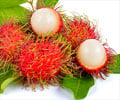The first recordings of brain-cell activity in an actively flying fruit fly have been obtained by scientists.
The first recordings of brain-cell activity in an actively flying fruit fly have been obtained by scientists.
A team of researchers at the California Institute of Technology (Caltech), including Michael Dickinson, Gaby Maimon and Andrew Straw, conducted the study.The work suggests that at least part of the brain of the fruit fly (Drosophila melanogaster) "is in a different and more sensitive state during flight than when the fly is quiescent," Dickinson said.
"Researchers have recorded the neural-cell activity of fruit flies before, but only in restrained preparations-animals that had been stuck or glued down. Gaby was able to develop a preparation where the animal is tethered"-its head clamped into place-"but free to flap its wings," he said.
Dickinson said that by slicing off a patch of the hard cuticle covering the brain, "we were able to target our electrodes onto genetically marked neurons."
A puff of air was used to spur the flies into flapping their wings, while electrodes measured the activity of the marked neurons and high-speed digital cameras simultaneously recorded the flies' behaviour.
In particular, the researchers focused on those neurons in the fly's visual system that keeps the animal flying stably during flight.
In their experiments, the researchers discovered that when the animals began to fly, the visual cells immediately ramped up their activity.
"The increase is very abrupt. It's not at all a subtle change, and so we suspect that there is a neurochemical quickly released during flight that sets the animal's brain in this different state," Dickinson added.
The research appears in the advance online edition of Nature Neuroscience.
Source-ANI
TRI
 MEDINDIA
MEDINDIA




 Email
Email








